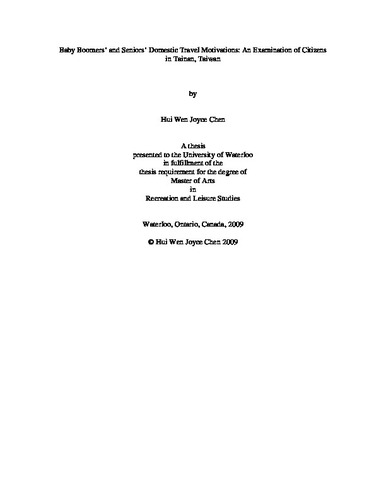| dc.description.abstract | The literature on the travel market has focused on the motivations and activities of different market segments, destination attributes, evaluation of well-being, travel behaviour and characteristics, and demographic information. Some work has been undertaken on seniors’ travel motivations but the majority of this worked reported for North America. Few comparisons have been made between baby boomers’ and seniors’ travel motivations and preferences for domestic trip. This study investigated the domestic travel motivations of baby boomer (age 50 to 60) and senior (age 61 and over) citizens in Tainan, Taiwan. The study objectives were: (1) to present demographic information on senior and baby boomer domestic travelers; (2) to examine the travel motivations, destination attributes, and well-being of senior and baby boomer travelers; (3) to determine the differences in travel-related characteristics between senior and baby boomer travelers; and (4) to investigate whether those who travel more domestically also travel more internationally. A total of 184 citizens (100 baby boomers and 84 seniors) in Tainan, Taiwan, participated in this study.
The data were analyzed using simple descriptive statistics, t-tests, cross-tabulations, chi-squared tests and correlation analyses. The open-ended questions were recorded and analyzed for themes. The demographic data revealed that marital status, employment status, education, income and major source of income were significantly different between baby boomer and senior respondents, as were travel motivations. The destination attributes sought and evaluations of well-being were not significantly different between the groups. Some differences were found in travel behaviours and characteristics reported by baby boomer and senior respondents, especially in the likelihood of traveling with an organized party, spending of money on traveling, joining an all-inclusive package tour, willingness to spend extra money on recreation, perceiving that seniors should stay at home or in silver town, and perceiving that travel improves their quality of life. In addition, traveling on overnight international trips influences the frequency of taking domestic trips for both groups.
This study contributes to the tourism literature by comparing baby boomer and senior respondents’ travel motivations and preferences in domestic trips. The findings provided new insights into the understanding of tourist motivations, destination attributes, positive/negative affects and tourists’ behaviors, particularly as experienced in domestic trip taken by baby boomers and seniors in Tainan, Taiwan. | en |

